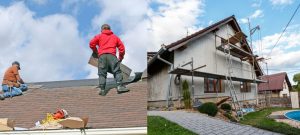
Why Roof Maintenance Is Essential for Preventing Expensive Repairs
Your roof is one of the most important parts of your home, yet it often goes unnoticed until a problem arises. Regular roof maintenance is essential to preventing expensive repairs and ensuring long-term protection. By staying proactive, homeowners can avoid costly damage and extend the lifespan of their roofs. This article explores the importance of regular roof maintenance and practical steps to keep a roof in top condition.
Why Roof Maintenance Matters
A roof is exposed to harsh weather conditions year-round, making it susceptible to wear and tear. Over time, this exposure can lead to minor issues that, if left unattended, may turn into costly repairs. Routine maintenance helps identify potential problems early, addressing them before they escalate.
Regular maintenance also improves energy efficiency. A well-maintained roof provides better insulation, reducing energy costs by keeping indoor temperatures stable. Additionally, a clean and debris-free roof prevents water damage and mold growth, preserving the overall structure of a home.
Common Roof Issues Caused by Neglect
Neglecting roof maintenance can lead to several issues, including leaks, structural damage, and increased repair costs. Some common problems include:
- Leaks and Water Damage: Clogged gutters, damaged shingles, and poor flashing can cause leaks, leading to water damage inside a home.
- Debris Buildup: Leaves, branches, and other debris can accumulate on a roof, trapping moisture and accelerating deterioration.
- Mold and Mildew Growth: A damp roof provides an ideal environment for mold and mildew, which can weaken the roof structure and pose health risks.
- Shingle Damage: Over time, exposure to wind, rain, and sunlight can cause shingles to crack, curl, or go missing, compromising the roof’s integrity.
- Structural Weakness: Persistent neglect may result in sagging or weakened roof supports, increasing the risk of collapse.
How Often Should Roof Maintenance Be Performed?
The frequency of roof maintenance depends on factors such as the age of the roof, material type, and local climate conditions. As a general guideline, homeowners should:
- Schedule a professional roof inspection at least once a year.
- Perform seasonal checks, especially after severe weather events.
- Clear gutters and remove debris regularly to prevent water buildup.
- Inspect for visible signs of damage, such as missing shingles or leaks.
Addressing minor issues promptly can prevent larger, more expensive problems down the road.
DIY Roof Maintenance Tips
Homeowners can take several simple steps to maintain their roofs and prevent damage:
- Clean Gutters Regularly: Remove leaves and debris to prevent water buildup and leaks.
- Check for Visible Damage: Look for cracked, missing, or curling shingles and address them promptly.
- Trim Overhanging Branches: Prevent tree limbs from damaging the roof during storms.
- Inspect Flashing and Seals: Ensure that seals around chimneys, vents, and skylights are intact to prevent leaks.
- Monitor for Signs of Moisture: Look for water stains or mold inside the home as indicators of potential roof issues.
When to Hire a Professional Roofing Contractor
While DIY maintenance can be useful, certain tasks are best handled by a professional roofing contractor. It’s advisable to hire a contractor for:
- Comprehensive roof inspections and assessments
- Repairs involving structural damage or extensive shingle replacement
- Roof cleaning, including moss or algae removal
- Gutter and downspout maintenance beyond routine cleaning
A qualified roofing contractor ensures that maintenance and repairs are performed safely and effectively, minimizing the risk of future issues. Contractors who are members of the National Roofing Contractors Association (NRCA) are particularly valuable, as they have access to industry-leading best practices, certifications, and affiliations. By working with NRCA members, homeowners gain access to expertise, networking opportunities, and resources that ensure high-quality results.
The Long-Term Benefits of Roof Maintenance
Regular roof maintenance offers several long-term benefits, including:
- Cost Savings: Preventative maintenance reduces the need for expensive repairs or premature roof replacement.
- Increased Roof Lifespan: Proper care extends the durability of roofing materials, maximizing investment value.
- Enhanced Energy Efficiency: A well-maintained roof helps regulate indoor temperatures, lowering energy costs.
- Improved Home Safety: A strong, damage-free roof protects a home and its occupants from the elements.
Final Thoughts
Roof maintenance is an essential part of homeownership. By conducting regular inspections, addressing minor issues promptly, and seeking professional assistance when needed, homeowners can avoid costly repairs and extend the lifespan of their roofs. Taking proactive steps today ensures long-term protection and peace of mind for years to come.
FAQs
How often should I schedule roof maintenance with a roofing contractor?
It’s recommended that roof maintenance be scheduled at least once a year. In areas with harsh weather, inspections should be done twice a year to prevent damage.
What are the key benefits of hiring a roofing contractor for maintenance?
A professional roofing contractor can identify early signs of damage, provide expert repairs, improve energy efficiency, and extend the life of your roof.
What are the most common roofing problems that maintenance can prevent?
Regular maintenance helps prevent leaks, shingle damage, mold growth, clogged gutters, and structural deterioration, which can lead to expensive repairs.
Can I perform roof maintenance myself, or should I hire a roofing contractor?
While homeowners can handle minor tasks like gutter cleaning, a roofing contractor should perform thorough inspections and repairs to ensure long-term protection.
How does roof maintenance save money in the long run?
Routine maintenance prevents major damage, reduces the need for emergency repairs, and extends the lifespan of your roof, ultimately saving thousands in replacement costs.
